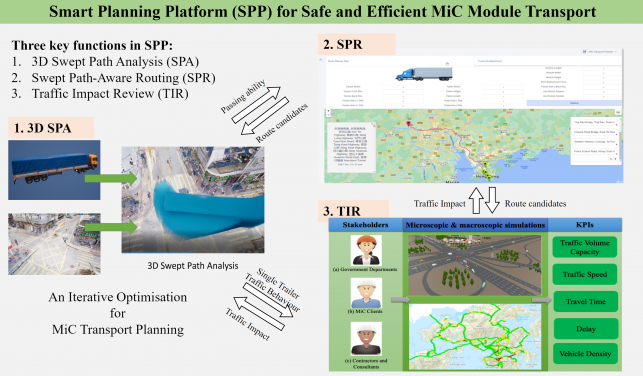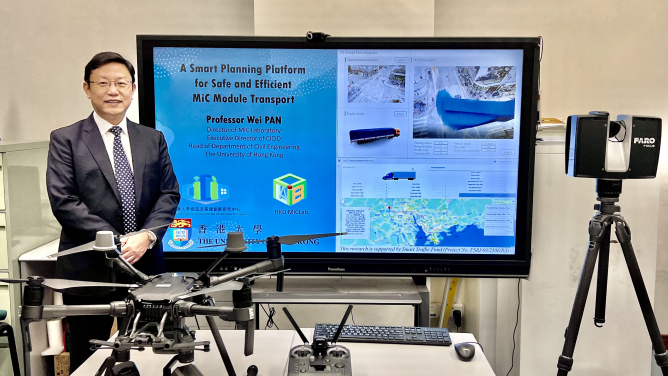Media
HKU Engineering Researchers Disrupt MiC Module Transport
05 Feb 2024
Modular Integrated Construction (MiC) is an innovative approach to construction with widely demonstrated benefits including enhanced productivity, quality, cost-effectiveness and sustainability, and reduced safety hazards, waste and reliance on-site labour. The Policy Address of the Chief Executive of the HKSAR states that the Government will adopt the MiC approach to build light public housing (LPH) units expeditiously, and about 30,000 LPH units will be completed in five years. The Government also suggests that the Housing Authority require all public housing projects scheduled for completion in the first five-year period (2023-24 to 2027-28) to adopt the MiC approach in suitable projects and in the second five-year period (2028-29 to 2032-33), no less than 50% of the projects will adopt the MiC approach and that Housing Society will also adopt the MiC approach in more public housing projects. Consequently, hundreds of thousands or even millions of bulky volumetric modules, prefabricated in factories located mainly in the Greater Bay Area, will be transported to the construction sites in Hong Kong for assembly. This inevitably poses a challenge to Hong Kong's transportation system. How to ensure transportation safety and efficiency through technology and innovation becomes crucial.
A multidisciplinary research team led by Professor Wei Pan, Head of Department of Civil Engineering at The University of Hong Kong disrupts MiC module transport by developing a smart planning platform for safe and efficient MiC module transport. This project has secured a funding support of HK$19,326,900 from the Smart Traffic Fund (Project Reference: PSRI/69/2306/RA). With additional matching funds from the university and industry, the total project budget amounts to HK$21,475,900.
The innovative smart planning platform will offer three core technologies that promise to revolutionise MiC module transport in Hong Kong, including 3D Swept Path Analysis (SPA), Swept Path-Aware Routing (SPR), and Traffic Impact Review (TIR). These cutting-edge technologies will help reduce module transport safety risks by at least 40% compared to daily routing tools and improve swept path analysis efficiency by at least 50% and traffic impact review efficiency by at least 40% compared to current practice. This 24-month project has kicked off recently and should safeguard the safe, efficient, and environmentally-friendly MiC module transport system of Hong Kong, ultimately benefiting the entire community.
Professor Wei Pan, Principal Investigator of the project, expressed enthusiasm about the disruptive nature of this research, and said, "The Smart Planning Platform will not only streamline MiC module transport but also contribute to Hong Kong Smart City Blueprint 2.0 and Smart Mobility Roadmap for Hong Kong. We are confident that this project will greatly enhance the safety and efficiency of MiC module transport." Professor Pan also expressed his gratitude to the wide range of government bureaus and departments, as well as industry organisations, for their strong support of the project.
About Professor Wei Pan (https://www.civil.hku.hk/wpan/)
Professor Wei Pan is a world-leading academic on sustainable construction engineering and management. He serves as Head of Department of Civil Engineering of The University of Hong Kong (HKU), Executive Director of HKU Centre for Innovation in Construction and Infrastructure Development (CICID), and Director of MiC Laboratory. His research interests cover MiC, smart construction, sustainable infrastructure, and net zero carbon. He has attracted over HK$120million research funding, and has authored over 330 publications and 12 patents. His work has gained significant recognition, being a Top 1% scholar worldwide by citations by Clarivate Analytics and a World’s Top 2% scientist released by Stanford University. Professor Pan has received many prestigious awards including Distinguished Young Investigator of China by the Chinese Academy of Engineering in 2019, the Chief Executive’s Commendation in 2020, and MiC Outstanding People in 2022.
About HKU Centre For Innovation In Construction And Infrastructure Development (CICID) (https://www.civil.hku.hk/cicid/)
CICID of HKU was established in 2002, aiming to foster continuous improvements and excellence in the construction industry and infrastructure development in particular, through the development of innovative strategies and techniques. CICID targets to be a “Centre of Excellence” for research, discourse and dissemination of innovations in infrastructure, construction management and methodologies, and interdisciplinary research.
About HKU MiCLab (https://www.miclab.hk/)
MiCLab was established in 2020 to lead innovative research in MiC to enhance its widespread uptake and adoption in Hong Kong and beyond. MiCLab involves a team of researchers with diverse research backgrounds covering construction engineering and management, structural engineering and material science, computer and control science, and supply chain management, etc. MiCLab has been leading systematic research and development on MiC.
Media Enquiry
Department of Civil Engineering, The University of Hong Kong
Mr Zheng Zhenjie (Tel: 6679 4797: E-mail: zhengzj@connect.hku.hk)


